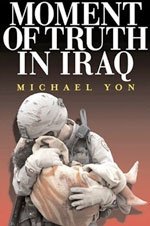 I previously reviewed Michael Yon’s book “Moment of Truth in Iraq,” which tells of his experiences while embedded with US troops in Iraq. The book talks a lot about how American soldiers are viewed by the Iraqi soldiers whom they train and fight alongside.
I previously reviewed Michael Yon’s book “Moment of Truth in Iraq,” which tells of his experiences while embedded with US troops in Iraq. The book talks a lot about how American soldiers are viewed by the Iraqi soldiers whom they train and fight alongside.
Yon writes:
“The American soldier is the most dangerous man in the world, and the Iraqis had to learn that before they would trust or respect us. But it was when they understood that these great-hearted warriors, who so enjoyed killing the enemy, are even happier helping to build a school or to make a neighborhood safe that we really got their attention.”
He says that before the invasion, Iraqis looked down on American soldiers. They thought we were soft, hiding behind our technology. Even after conquering the country quickly, they could chalk that up to our superior equipment. But over time, they observed the American willingness to fight and suffer.
“It was only after, when they saw that our people were better street fighters, too, and that American combat soldiers would match or outlast them in the heat, that they began to understand. At this point, the man to man respect was there.”
Not only that, but Iraqi soldiers watched, and tried to copy, their American counterparts. For them, it was a matter of learning from the best. I loved this part:
“Iraqi soldiers and police constantly emulated marines and soldiers. When he got back from missions, SSG Lee worked out. The Iraqis would watch him and start doing their own exercises. Lee was just being himself, and the young Iraqis wanted to be like him….By showing that the strongest soldier is also disciplined, just, and compassionate, soldiers like SSG Lee were winning the moral high ground in Iraq and devastating Al Qaeda. I saw an Iraqi Army lieutenant named Hamid treating prisoners with respect, because he had seen American soldiers do it.”
In the Iraqi army, officers had led from the rear. Now they learned a different type of leadership. “The Iraqis were amazed that American officers and sergeants would lead from the front into the worst situations…..Soon the Iraqi officers who survived and mattered were leading from the front.” He adds, “Iraqi soldiers might be a lot of things, but cowards they are not….Courage is not in short supply in Iraq.”
Yon writes that everywhere he went, Iraqis responded to strong leadership.
“Leading the Iraqis by example worked, but cost us casualties. The American combat soldiers I was with in Mosul in 2005 were not there to play it safe. Their goal was to win. If it cost blood, then blood it would cost. The Iraqis were wild for that sort of leadership.”
The Abu Ghraib and torture abuses left stains which had to be overcome, and which initially deprived us of the moral high ground which is crucial to counter-insurgency. But, Yon writes:
“Even during the outrages of the Fallujah-flattenings and prisoner rape-torture debacles, Iraqis never turned against us the way they would later turn against al Qaeda. We were never completely evil in their eyes. Dumb, overbearing, disrespectful, but not evil….Though Iraqis know we were torturing Iraqi prisoners earlier in the war, overwhelmingly they accept that we have straightened up and that Americans now treat prisoners very well….
“They knew we did a lot of stupid and overbearing things, even brutal and criminal things at times. But they also could not deny that, on the whole, our people had a heart for them, or at least for their kids.”





